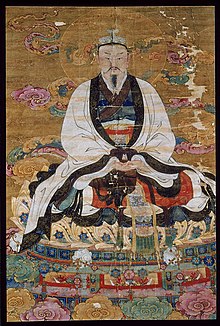Jade Emperor
The Jade Emperor (Chinese: 玉皇; pinyin: Yù Huáng or 玉帝, Yù Dì) is one of the representations of the first god (太帝 tài dì) in Chinese mythology and religion. In Daoist theology, he is associated with Yuanshi Tianzun, one of the Three Pure Ones. He is also the Cao Đài ("Highest Power") of Caodaism. He is often identified with Śakra in Chinese Buddhist cosmology.[1][2][3][4] In Korean mythology, he is known as Haneullim.[1][5][6]
| Jade Emperor | |||||||||||
 Jade Emperor in a Ming Dynasty ink and color painting on silk, 16th century | |||||||||||
| Chinese | 玉皇 | ||||||||||
|---|---|---|---|---|---|---|---|---|---|---|---|
| Literal meaning | Jade Emperor | ||||||||||
| |||||||||||
| Second alternative Chinese name | |||||||||||
| Chinese | 天公 | ||||||||||
| Literal meaning | Heavenly Grandfather | ||||||||||
| |||||||||||
| Third alternative Chinese name | |||||||||||
| Chinese | 玉皇大帝 | ||||||||||
| Literal meaning | August Emperor of Jade | ||||||||||
| |||||||||||
The Jade Emperor is known by many names. Some names include (1) the Heavenly Grandfather (天公, Tiān Gōng), which originally meant "Heavenly Duke", (2) the Jade Lord; (3) the Highest Emperor; (4) Great Emperor of Jade (玉皇上帝, Yu Huang Shangdi or 玉皇大帝, Yu Huang Dadi).[1][6]
Mythology
The Jade Emperor was originally the assistant of the Divine Master of the Heavenly Origin, Yuanshi Tianzun. Yuanshi Tianzun is the supreme beginning, the limitless and eternal creator of Heaven and Earth. He picked Yu-huang, or the Jade Emperor, as his personal successor.[1][6]
The Jade Emperor will later be succeeded by the Heavenly Master of the Dawn of Jade of the Golden Door (金闕玉晨天尊).[7] The characters for both are shown on the front of the arms of his throne.[1][6]
In two traditional writing texts produced in 1925 and 1972, Guan Yu became the 18th Jade Emperor in about 1840 AD.[8][9] However, some have disagreed that Guan Yu has succeeded. And thus the Jade Emperor and Guan Yu are often worshiped separately.[10] In Tienti teaching, the ruling Jade Emperor has 55 predecessors.[11] However, this is from the opinion of the Chinese folk religion. Many Taoists do not believe these claims to be true.[1][6]
Festivals
The Jade Emperor's Birthday (天公誕) falls on the ninth day of the first lunar month.[12] On this day, Taoist temples perform a Jade Emperor ritual (拜天公, bài Tiān Gōng, literally "heaven worship"). In this, priests and common people lie straight on the ground, burn incenses and make food offerings.[1][6]